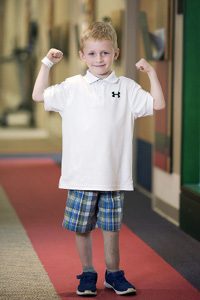
Tommy is open to talking about his leg, helping to educate other kids about how we all have differences.
“Stop looking at him! Don’t stare!” It’s something Mary Kay sometimes hears when she is out with her son, Tommy, especially at the pool. But her usual reaction surprises some.
“Oh, do you want to see?” she’ll invite. “Come look. He has a special leg.”
Tommy, 8, is missing part of his left leg. The young Shriners Hospitals for Children — Chicago patient typically uses a prosthetic leg provided by pediatric orthotic and prosthetic services at the Chicago Shriners Hospital. But at the pool he is more likely to be found hopping on his strong right foot.
Rather than hiding Tommy’s disability, Mary Kay has found that it helps build her son’s confidence when they work together to educate others. Gathering interested kids and parents around, she will explain about Tommy’s limb difference. “I tell them, ‘We have two bones in our leg. But he was born with one. He has a special leg. Come on over!’
“We like to be proactive instead of just pretending,” she said.
Planning for success
Mary Kay’s advice lines up with what Shriners Hospitals for Children psychologists recommend for promoting acceptance: Have plans in place ahead of time and find ways to help everyone become more comfortable.
Heather Russell, Ph.D., is a licensed clinical psychologist at Shriners Hospitals for Children — Philadelphia. She has many strategies to help families of children with disabilities foster acceptance and build confidence. Anticipating potential trouble spots is key.
At school, that means communicating with teachers, the principal and the school nurse, early and often, Dr. Russell said. Set up meetings with these key people before school starts to answer their questions and let them know what sort of help your child may need – or not need. Before ending the meeting, schedule a follow-up to discuss how things are going and whether adjustments are needed.
Other things to help ease the way:
- Do a dry run with your child, practicing moving around the school from class to class.
- Know who to talk to – such as teachers, the principal or the school counselor – in case there are issues with other students, their parents or with staff.
- Schedule play dates or outings with school friends leading up to the first day of school in order to help all the kids feel more comfortable.
Another of Dr. Russell’s recommendations is to suggest a discussion about differences to occur early in the school year. Having a physical disability is only one of the ways people can be different. This can lead to a discussion, on a classroom level or at a whole school assembly, about diversity and respect.
When Tommy started preschool, Mary Kay reached out to his teacher. She said his class did a lesson similar to show-and-tell about everyone’s differences, not just Tommy’s. “Anyone who had a difference could raise their hand and share,” Mary Kay said. “‘I have glasses,’ ‘I have this or that.’ When it was Tommy’s turn, he said, ‘I have a prosthetic leg.’”
Dr. Russell said it’s good for children to know how to talk about their disability when asked. Kids should find a short, honest answer that feels comfortable to them. They can practice this answer by role-playing various situations with a trusted adult or friend.
–Mary Kay
Mary Kay said Tommy is learning to gauge his own comfort level with how much he wants to share. She said sometimes children ask him to remove his prosthetic leg. “Sometimes he is willing to pop it off and show them,” she said, while other times he chooses not to.
Education and celebration
Sometimes all the preparation in the world can’t prevent a tough situation from occurring, Mary Kay admitted. If Tommy runs into kids who don’t know him and pepper him with questions or make unkind comments, she’ll let Tommy handle it, up to a point. “He’s only 8, so sometimes I’ll step in and help.”
Even in these situations, she sticks to her message of education and celebration. “I point out that everyone is different, and wouldn’t it be boring if we were all the same,” she said.
The messages of confidence and acceptance can have lasting effects. Far from being defined by his limb difference, Tommy has many interests and special qualities, his mother said. “He is very independent in not caring what other people think he should be into,” Mary Kay said. The youngest of four siblings, he is a sensitive, creative little boy who loves eating sweets and making people laugh.
In fact, she said, his developing sense of humor keeps his family on their toes. Mary Kay said Tommy recently pulled a prank on one of his older sister’s new friends, taking off his leg and pretending to fall in front of her.
Through it all, Mary Kay said, “Celebrate your child.”
“As moms, as parents, we already have an idea of what our child’s life will be like,” she said. “Then, it isn’t what you imagined. But you have to just embrace what God gave you and make the best of everything. Difference is what makes the world go around.”
Shriners Hospitals for Children has specialized orthotic and prosthetic professionals onsite at many of our locations to help provide devices and support for children who need them.





